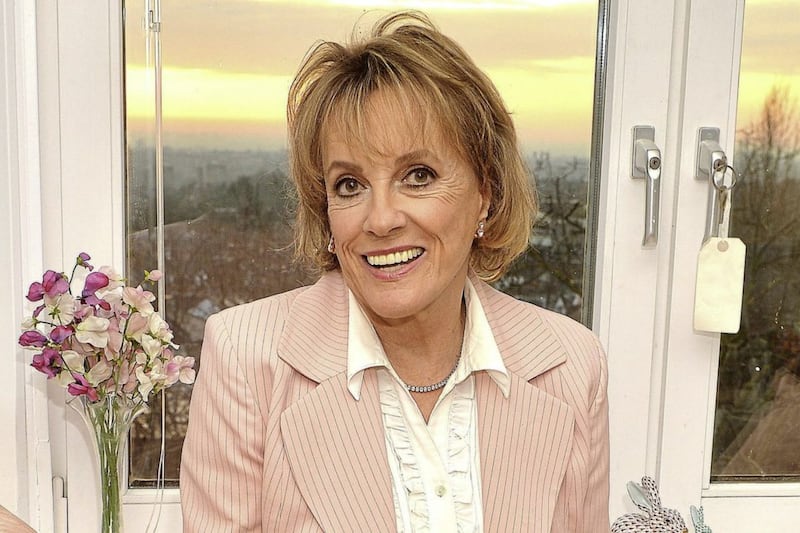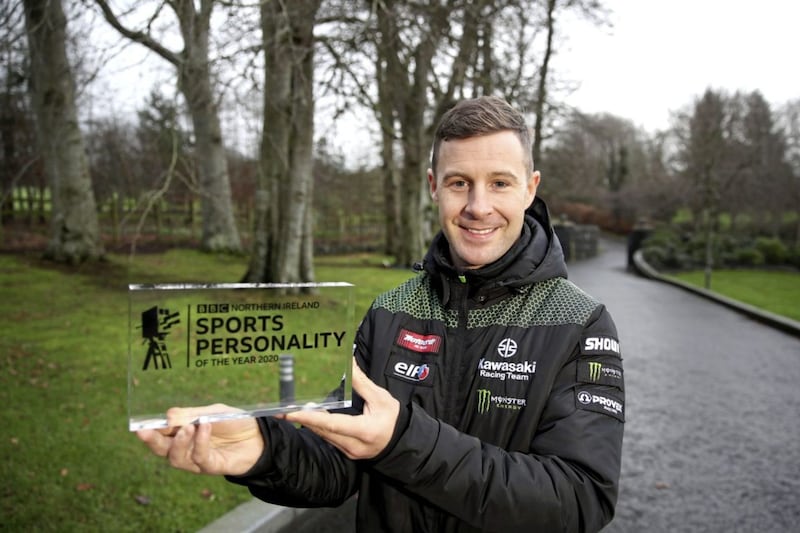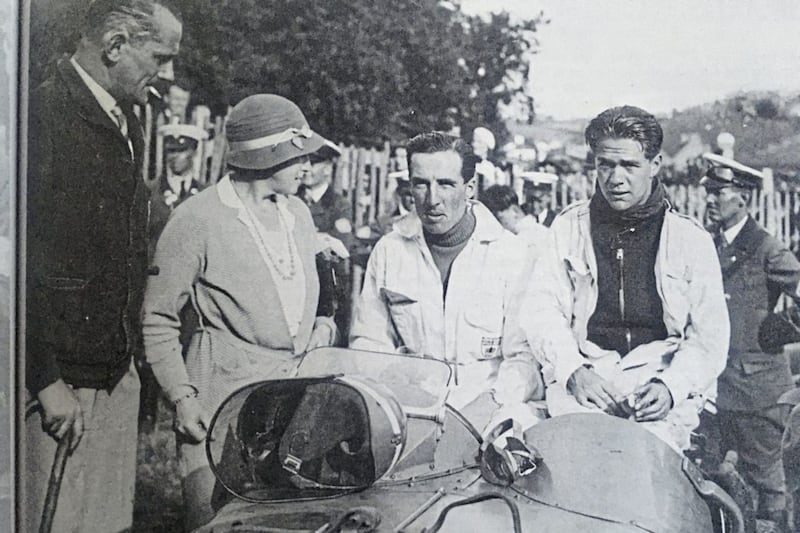HE’S not ‘poor old Jonny Ray’, he’s rich, young Jonathan Rea. He wears his baseball cap backwards. He calls himself Superbikes’ ‘greatest of all time’ and compares his current dominance to previous spells in other sports by Tiger Woods and Michael Schumacher.
Yet, having said all that, he’s still extremely likeable and down-to-earth.
In a twist on the old insult, Rea is actually a modest man with little to be modest about.
The first ever rider to win four consecutive World Superbike Championships, only a ‘desert storm’ prevented him adding to his record-breaking achievements, torrential rain forcing the cancellation of the last race of this season in Qatar.
The 31-year-old had won the previous 11 races and was odd-on to overtake American Doug Polen’s record number of 17 victories in a season only for the adverse weather.
So he’s quite right to talk himself up, not that he does that unprompted.
And yet there are still some who question the east Antrim man.
Moto GP?
Those who wonder why he hasn’t done it in Moto GP, the top level of the sport.
As stated, Rea is a genuinely modest, affable guy – but he also knows his own worth.
Asked the rather ridiculous question if he feels he has anything to prove, he hesitates, then, rather than swearing at me, replies:
“Em…no…because, in racing terms, in SuperBike terms, right now I’m the greatest of all time. I’m having incredible fun. If I could do things differently, I don’t think I would.”
He’s open enough to acknowledge that he would like to have properly tested himself in MotoGP, rather than merely the two meetings he contested in 2012 as a stand-in for the injured Casey Stoner.
“I honestly feel now my days are numbered there,” he admits. “I’m 31 now and I didn’t grow up in that paddock, unfortunately.
“MotoGP, in bike terms, is the pinnacle, but unfortunately for me Kawasaki don’t race in MotoGP, they pulled that project years ago to focus on World SuperBikes and developing their bikes there.
“Whilst I’ve had some opportunities to go there [to MotoGP], they’ve not been with competitive machinery.
“I one hundred per cent believe that if I went there with the right tools and the right people around that I could be one of the top guys there.
“But it doesn’t make sense for me and my career to go there and not get what I deserve.
“I’m just so happy with SuperBikes, the people I work with and everybody around, so I don’t know what I’m looking for [elsewhere], do you know what I mean?
“It’s always nice, at the beginning of the season I had a lot of hype from a few MotoGP teams and my manager was really busy, but when the options were put in front of me Kawasaki always stood out as what I wanted to do…
“I never feel like I’ve ticked the box and I’m the best – I always want to improve.”
Normal life
Those comments tell you much about Jonathan Rea. Honesty. Belief. Self-worth. Happiness. People. Desire to be better, win more.
Those are the things that matter to him, and he explains his approach to life even more clearly:
“I race 13 races a year, all around the world, and that’s tough already. But in the other paddock [MotoGP], next year they’ve got 20 races a year, and they don’t get paid too much more than what we do.
“I really value trying to be normal and in the other paddock you can’t have a normal life, you’ve got to eat, sleep, and breathe bikes all year round, with little off-season.
“For me, family’s important, and SuperBikes has that family feel to it, very accessible to fans as well, and that suits me and my lifestyle down to the ground.”
Some suggest his stunning superiority adversely affects interest in WSB, but that won’t deflect him from his pursuit of podium finishes:
“It’s really hard, especially with the results we’ve had in the last few years, but I think you have to turn your eye away from that because, in sport, you always have eras where there’s been a dominant guy, like Tiger Woods in golf or Michael Schumacher in F1, or whatever.
“SuperBike is owned by the same company that owns MotoGP, and they’re clever people. MotoGP was really suffering three, four years ago, and they turned it around and now it’s an incredible show. It far surpasses F1 in terms of entertainment.
“From a SuperBike point of view, we race production-based bikes that were born for street use, you can buy them in your local dealer shop, and I feel that accessibility has to be reciprocated in the fan-base that go there [to WSB races]. It should be very easy to go there as a motorbike fan but also for families.
“I’m a huge fan of events like the NorthWest 200 or the Isle of Man TT, these racing events where it’s not even just about the racing.
“People sometimes go to the Isle of Man to watch the racing and never see a race because they’re either partying, or there’s a festival feel with artisan local food produce, carnival for kids, and so on – SuperBikes should probably get closer to that.”
Family values
The importance of family to him is clear. They’ve made him what he is, and he’s always appreciative.
His granda John Rea sponsored the late, great Joey Dunlop. His dad Johnny was a road racer himself, winning a TT in 1989 and competing regularly in the UK and Ireland.
Yet even with that background, the journey Rea has been on is remarkable: “Unreal, completely. It’s mad, it’s not normal.
“I always thank the people around me because I could never do this myself. I’ve always had a lot of people who’ve believed in me and I’ve had great opportunities – of course, I’ve had to make the best out of the opportunities but I don’t for once take it for granted.
“I realise the journey I’ve been on, the amount of effort mum and dad put in when I was going to motocross, taking me around Ireland, and then quickly I became fast here, so we went and did it in the UK, travelling the length and breadth of the UK.
“From there to where I am now, I couldn’t have done it without the commitment shown by mum and dad going all-in with me and encouraging my dream. They embraced it and got right behind me.”
Those are the three elements that make up the title of his autobiography: ‘Dream. Believe. Achieve.’
Plenty have the dream. Few believe in themselves as he does. Fewer still – no one else, in fact, ever – achieve what he has done.
Even with the support of his family it was far from easy, though.
Racing costs
His dream was actually to go ‘pro’ in motocross, his first sporting love, but the cost was prohibitive.
Indeed it’s harder than ever for anyone from a normal background to follow in Rea’s tyre-tracks.
‘Buying a ride’ is an ugly phrase, something you’d imagine people would be embarrassed about, but it’s the way to the top for many in modern motorsport:
“It started in car racing, and nowadays I don’t think there’s any drive available if you can’t bring some money, certainly the number two seats on teams.
“In [motorcycle] racing, it’s slowly happening: in MotoGP that’s exactly how it works. To start racing in Moto3 you’ve got to race the Junior World Championship in Spain and the best riders have to pay for rides, and they cost anything from 150,000 euro to 200,000 euro per season for a six-round championship – and that’s ludicrous.
“I feel the SuperBike route is more achievable for anyone. You can go through the British Championship where talent still really matters and there’ll still be teams that give you opportunities who don’t expect you to bring ludicrous money.
“I came from a great family – but they didn’t have blank cheques to write out to pay for my racing. Like I explain in the book, the opportunity that came my way, they just don’t exist anymore – so I had to grab it with both hands.”
Getting back on track
The setbacks that Rea has overcome have been significant, including a shattered femur at the age of 17, after which he was told that he’d never race again.
In his very readable autobiography, he hints at depression at that time, and recalls: “It was tough, and I’ve faced my demons. Not just coming back from injuries but when things aren’t happening for you, when you’re really trying to force the issue and make it happen, and it seems that everything is against you.
“I think the best piece of advice I ever got, not for general life but racing motorbikes, was: ‘It’s like surfing, you can’t force a wave to come; but when a wave comes, you’ve got to be ready and face it with a positive attitude’. That can be applied in any walk of life.
“I was really lucky that lying in my hospital bed I got the inspiration of a contract offer to go to race SuperBikes.
“That turned dark days into light at the end of the tunnel, gave me a reason to get up in the morning and really push through the injury.
“It’s tough: racing’s a confidence game and if your brain’s not right, or you’re not in it, it’s not going to work out. I work a lot at keeping my team around me really good and keeping my spirits up.”
The only time the affable Rea appears almost annoyed is at the suggestion that he ‘deserved’ some luck in life after twice suffering serious injuries caused by brake failures:
“No, I don’t feel like you deserve anything, I think you have to work hard for what you get.
“I’ve had more injuries than most of a similar timeline but my brain works in weird ways. You know when you’re getting it good? I always think you’re not going to get it good for too long, it’s strange.
“Sometimes I’ll be at a track, going faster and faster and faster and I say to my team ‘We should stop the test now because something’s going to happen, I’ve got a bad feeling’ – and it doesn’t.
“But I don’t feel like you deserve anything in life, you have to work bloody hard for it, because there’s always somebody else out there working harder.”
The man from...where?
Jonathan Rea knows where he’s come from, even if many still argue about it. “I get claimed in Larne and Ballyclare,” he says with a laugh, “and it’s a big fight, but I spent most of my childhood in Kilwaughter and then when I was 12 or 13 we moved up to Ballyboley after a few break-ins, we had bikes stolen and all sorts.
“Ballyboley was even stranger because we were Larne Borough Council with a Ballymena area [telephone] code, and a Ballyclare postcode! – so it was a real strange place, Ballyboley.”
Jonathan Rea could be forgiven for resting on his laurels after all he has won, and having moved back home with wife Tatia and young sons Jake and Tyler, to all three of whom he dedicated his autobiography.
However, he’s already declared his determination to complete the ‘ride for five’, and become the ‘winningest’ World Superbike racer ever.
His technical input into improving his Kawasaki has played its part, and he’s continually seeking improvement in his machine as well as in his own riding performances: “This year we didn’t have the out-and-out power of years before, but we had a very rideable bike which produced power in all the right areas.
“Next year we have a new bike coming which should be a step forward, I feel like I’ve influenced the development of that bike - but of course other manufacturers are also releasing new models next season, so it never stands still.
“From as early as the end of last season we were discussing continuing the agreement. After a few races we managed to agree terms again and continue for another two years with Kawasaki Racing Team.”
Back home - to the future
The big move in his life this year was to re-locate from the Isle of Man to near Templepatrick, with his Australian wife Tatia and young sons.
“It wasn’t a big persuasion [for her] to come here. She’s always lived in the UK, she grew up working for F1 teams and event management and then SuperBikes, which is how we met, so she never spent a lot of her time in Australia as an adult.
“When we hooked up we ended up living in the Isle of Man for eight years so it wasn’t a huge negotiation to move back home, where we’ve a great support network around us and a great quality of life.”
Having cited the support from his own family, he says he will let his own boys race – although he admits he’d rather they didn’t: “Of course, they have bikes, they ride, they really enjoy it, and it makes me proud – but I would prefer if they didn’t race.
“I would love if we could just on our land together just ride and enjoy that as a family. But if they want to race in the future, of course, it’s my job as a parent to encourage them in whatever they want to do, be it racing bikes, setting up a business, whatever it might be.
“At least in bikes I kind of have got an idea what I’m doing, so I can help them a bit better – but part of me, when I finish racing, I don’t want to go from SuperBike racing to more bloody motorbike tracks for the rest of my life.
“I crave some kind of normality, like normal family holidays, normal weekends at home with family.”
Jonathan Rea could retire from racing now, as a motorbike legend – but his desire to be the best he can be will keep him on track for at least another season or two.
* 'Dream. Believe. Achieve', the autobiography of four-in-a-row World SuperBike champion Jonathan Rea, is out now from HarperCollins, priced £20.







